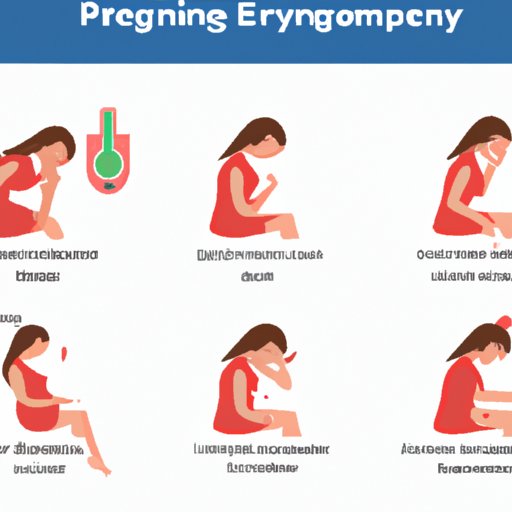
I. Introduction
Many women eagerly anticipate the moment they will feel the first symptoms of pregnancy, yet the uncertainty surrounding these early signs can also cause apprehension. It is natural to be curious about when you will start experiencing pregnancy symptoms, and how long to expect to feel them. In this article, we’ll explore when pregnancy symptoms typically start, how long they last, and ways to find relief. Whether you’re a first-time mom or have been pregnant before, knowing what to expect can help you feel more in control and prepared for the changes ahead.
II. When Can Pregnancy Symptoms Start?
According to medical research, pregnancy symptoms can start as early as one week after conception, or around the time of a missed period. However, many women don’t experience any symptoms until several weeks into their pregnancy.
It’s important to note that pregnancy symptoms can vary widely from woman to woman, and even from pregnancy to pregnancy. Some women may experience symptoms very early and intensely, while others may not have any noticeable symptoms at all. It’s also possible to experience some symptoms during one pregnancy but not during another.
Many women are eager to share their personal experiences on forums and social media platforms. Some women report experiencing symptoms as soon as a few days after conception, while others have reported not feeling any symptoms until several weeks into their pregnancy. But it is also important to remember that every pregnancy is different.
III. Early Pregnancy Symptoms vs. Later Symptoms
While some women may experience early pregnancy symptoms right away, others may not feel anything until later in their first trimester. Personal experiences can vary widely based on a variety of factors. Some women may feel nauseous and experience fatigue within the first few weeks, while others may not have any symptoms until later in their pregnancy.
Many women find that early pregnancy symptoms are similar to premenstrual symptoms, such as bloating, cramping, and breast tenderness. Other early symptoms may include fatigue, nausea, vomiting, and food cravings or aversions.
IV. Common Pregnancy Symptoms and Duration
Here are the most common pregnancy symptoms, along with how long they typically last:
- Nausea and vomiting: commonly known as morning sickness, it normally starts around week 6 and subsides by week 14.
- Fatigue: feelings of extreme tiredness are common in the first trimester and may last throughout the pregnancy.
- Food cravings or aversions: these can vary throughout the pregnancy and may be experienced through the entire nine months.
- Frequent urination: starts within the first few weeks and may continue throughout the pregnancy due to the pressure placed on the bladder by the growing uterus.
- Mood swings: due to hormonal changes, mood swings can be experienced throughout the pregnancy.
It’s important to remember that every woman’s response can vary, and some may not experience these symptoms at all.
V. Factors That Affect the Timing of Pregnancy Symptoms
While pregnancy symptoms typically start within the same timeframe for most women, timing can vary based on a variety of factors. Age, health, lifestyle, and genetics can all impact when pregnancy symptoms start. Women who are older or have health conditions may experience symptoms earlier than younger, healthier women. Additionally, some women may not experience symptoms as strongly or for as long due to genetics and other factors.
VI. Relief for Pregnancy Symptoms
While pregnancy symptoms can be uncomfortable, there are ways to find relief. Eating small, frequent meals throughout the day, staying hydrated, and getting plenty of rest can help ease nausea and fatigue. Wearing support bras can bring comfort to sore breasts, and gentle exercise can both help boost energy levels and reduce stress levels.
For some women, natural remedies such as ginger or peppermint tea can help soothe nausea. However, it’s essential to discuss any supplement or treatment with a doctor before trying it during pregnancy.
VII. Is the Absence or Delay of Pregnancy Symptoms a Cause for Worry?
Some women may worry if they don’t experience pregnancy symptoms as expected, or if their symptoms disappear. However, the absence or delay of symptoms does not necessarily indicate a problem with the pregnancy. Women should speak to their healthcare provider if they experience any concerning symptoms such as bleeding or severe cramping.
VIII. Conclusion
While pregnancy is a time of great excitement and anticipation, it can also bring uncertainty and worry. Knowing what to expect regarding pregnancy symptoms can help reduce feelings of anxiety and help prepare for the changes ahead. Whether you experience symptoms early or late in your pregnancy, remember that your experience is unique and there is no “right” way to experience pregnancy. Take care of yourself and your growing baby by staying informed and seeking guidance from your healthcare provider as needed.




